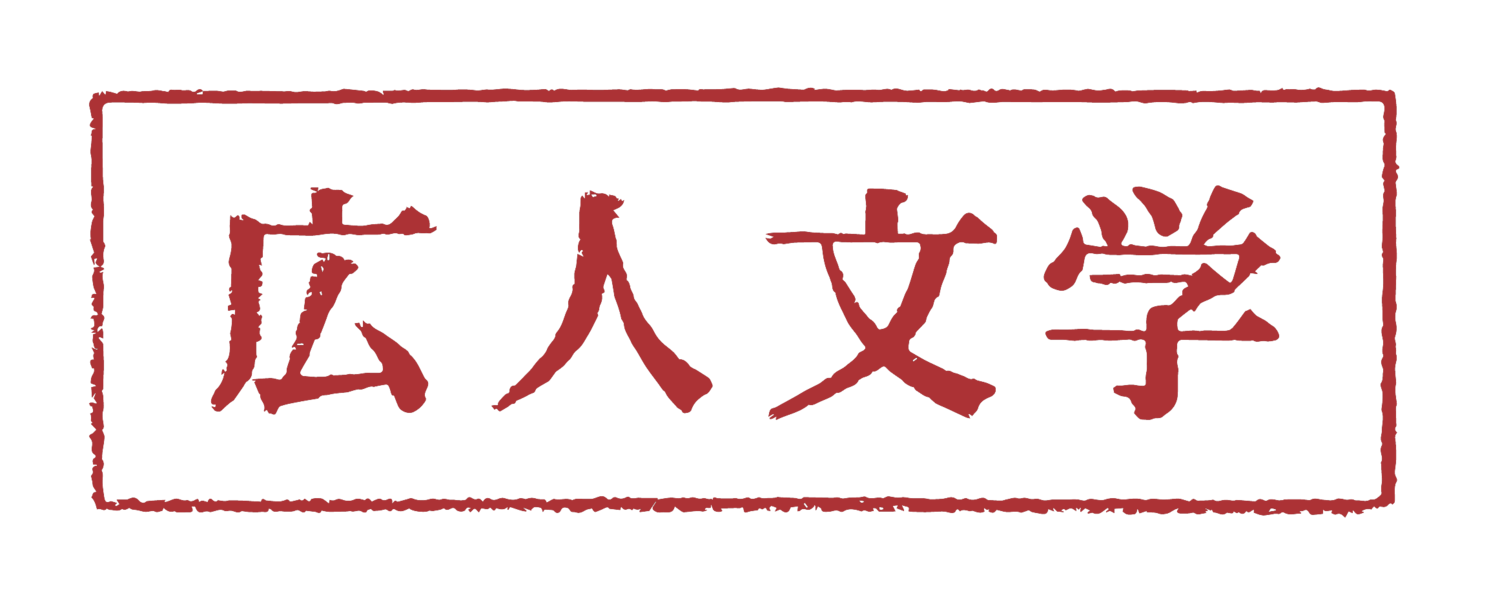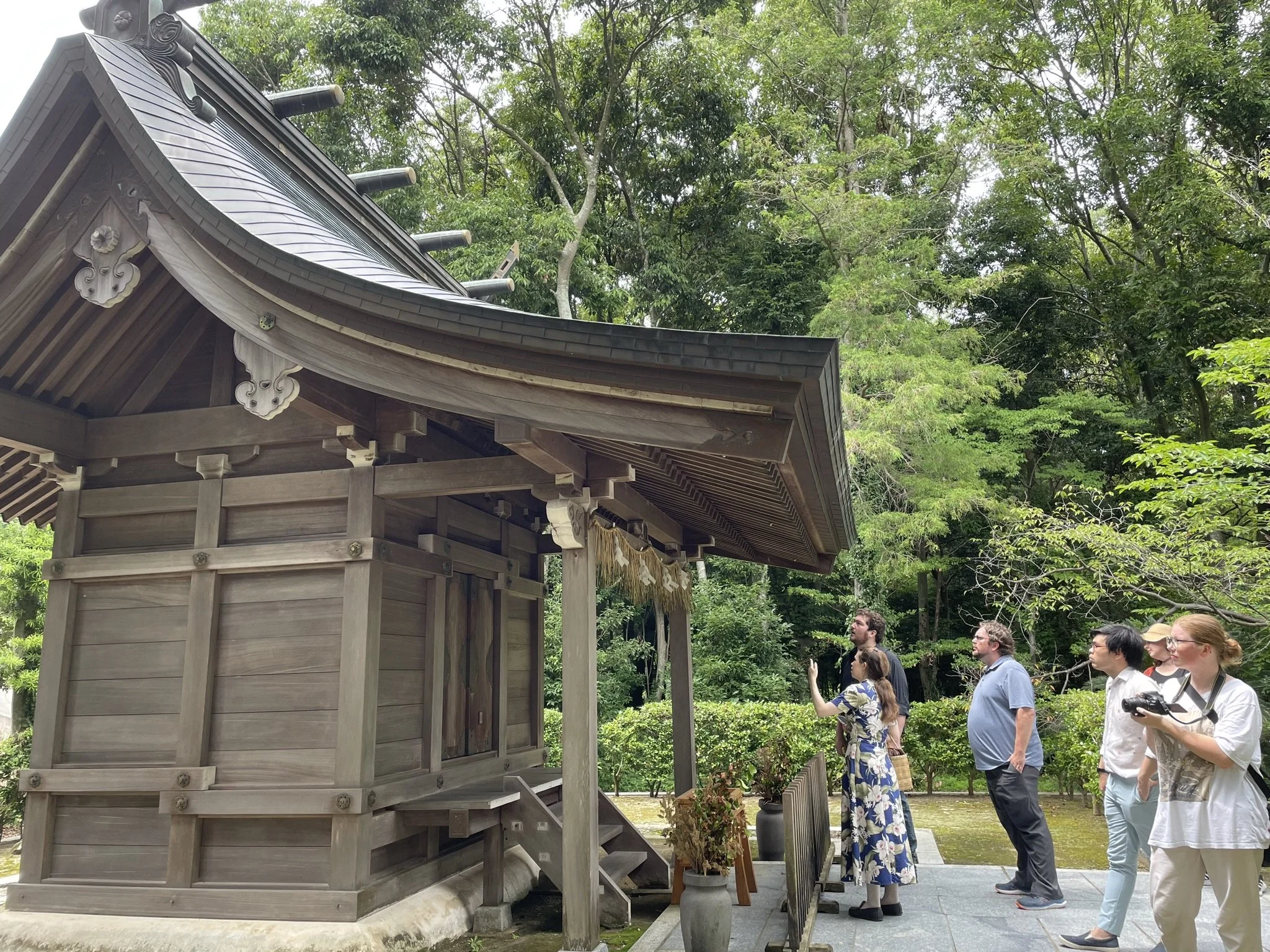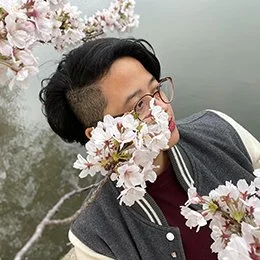Lanterns at Kasuga Taisha, Nara
Visiting faculty give intensive courses or special lectures. These scholars visit from institutions in the US, Europe, Australia, and Asia, rank among world experts in their fields. They are chosen to enhance the curriculum or to support the research pursued by a particular student or students. Intensive courses range in a diverse number of topics. Below is a selection of past and upcoming intensive courses.
Modern Shrines and “Shinto”
Karli Shimizu
June 2023
In this intensive seminar, author of Overseas Shinto Shrines: Religion, Secularity and the Japanese Empire (Bloomsbury Academic, 2023) Karli Shimizu of Hokkaido University encouraged students to rethink concepts that have been taken for granted historically, including religion, secularism, time, space, and cultural boundaries, and to broaden their understanding of Shinto shrines by looking ones established inside and outside of Japan’s current borders in the modern era.
Historians at Work
Ellen Van Goethem, Various Guests
December 2021–February 2022
Through a series of lectures and seminars offered in collaboration with historians of Japan, students are introduced to the latest research and methodologies in the field. Our scope extends across time to include ancient through modern Japan. Scholars will typically offer two sessions each. One session will be the standard research presentation, but here, scholars will look beyond the typical elite-based/center focus, and actively try to include those outside or on the fringes. The other session will provide a behind-the-scenes glimpse of the research approaches, archives, available technologies, … that underpin this research and its presentation or will present you with an opportunity to ask questions about what it means to be a historian in academia or in alt-ac careers.
Participating scholars are Marjorie Burge (University of Colorado Boulder), Paula Curtis (UCLA), Michelle Damian (Monmouth College), Xiaoyang Hao (Fukuoka Women’s University), Nadia Kanagawa (Furman University), Yumi Kim (Johns Hopkins University), Morten Oxenboell (Indiana University), Peter Shapinsky (University of Illinois Springfield), and Travis Seifman (University of Tokyo).
The Idea and Praxis of Medievalism: Castles, Samurai, and Mongols in Modern Japan
Ellen Van Goethem, Ran Zwigenberg, Various Guests
October 2021–January 2022
Both at home and abroad, Japan’s castles serve as prominent symbols of local, regional, and national identity. Castles occupy the centre of most major Japanese cities and are universally recognizable as sites of heritage and as a link to the nation’s past. The current prominence of castles obscures their troubled modern history.
After the restoration of 1868, castles, no longer of immediate military significance, became symbols of
authority, on one hand, and of vaunted tradition on the other. Castles were major sites of exhibitions, where they were often contrasted with Japan’s achievements in acquiring modern technology, serving as potent illustrations of wakon-yōsai (Japanese spirit and Western technology). Castles were but one of the many sites, both physical and metaphorical, of dissemination of the “medieval” in modern Japan. An import from the West, the notion of a medieval era (chūsei), and the “invertible” progress into modernity that followed, were supposed to endow Japanese history with the dignity and worth of a Europeanised history. Thus, the Warring States period (a term which was itself an import from China), was called the Japanese Wars of the Roses, samurai were termed knights, and bushido—a mostly 19th-century rehashing of earlier ideas—was made a Japanese form of chivalry. Such uses were directed at both international audiences and at domestic ones, as Japan sought a “usable past” for the purpose of nation-building.
Using Zwigenberg’s lectures on castles as its core, our series examines various aspects of modern “medievalism,” and aims to reconsider narratives of continuity and change in modern Japan, examining the changing role of the medieval in Japan’s troubled politics of history. The seminar will feature, in addition to Zwigenberg’s lectures, a series of guest lectures on topics like the Mongol invasion, bushido, Japanese bronze statuary, and explores a wide gamut of topics beyond castles and architecture.
Guest lectures by Tatiana Linkhoeva (NYU), David Weiss (Kyushu University), Sven Saaler (Sophia University), Oleg Benesch (University of York), Michael Wert (Marquette University), and Judith Fröhlich-Vitale (University of Zurich).
Religion in Manga, Anime, and Popular Media
Emily B. Simpson
August-September 2021
Religion in manga and anime often calls to mind the shrines, deities and mischievous spirits (yōkai) associated with Shinto and folk religion in Japan, featured prominently in several popular Studio Ghibli films and the 2016 international blockbuster Your Name. Buddhism also appears prominently, from Osamu Tezuka’s famous Buddha to Saint Young Men, which features Jesus and Buddha as roommates experiencing day-to-day life in Tokyo. But as the latter title suggests, interpretations and adaptations of religious figures, narratives, concepts and practices in popular media are rather complex and go beyond individual religions.
In this course, we explore how a variety of manga, anime, video games and other media portray religion in Japan, across the globe, and in fictional worlds. Yes, we will read manga and watch anime for this class, but we will also draw course materials from textbooks on diverse religions and scholarly articles on the portrayal of religious themes in popular media in Japan and elsewhere.
Archaeology and Heritage
Ellen Van Goethem, Various Guests
July 2021-February 2022
Through a series of lectures and seminars offered in collaboration with overseas specialists in archaeology and/or heritage studies, students are introduced to the latest research and methodologies in the field. Our scope extends across time and space to include prehistoric Japan, medieval Europe, classical Maya, cultural heritage therapy, heritage of resistance, etc. Participating scholars include Ilona Bausch (Leiden University), Enrico Crema (University of Cambridge), Wim De Clercq (Ghent University), Anabel Ford (UCSB), Carl Gellert (Seattle Central College), Sherman Horn (UCSB), Simon Kaner (Sainsbury Institute/University of East Anglia), Mark Hudson (Max Planck Institute), and James Loftus (Kyushu University).
Japanese Religious Studies Behind the Scenes
Multiple Guests
June 2021-February 2022
This graduate seminar brings together leading scholars of Japanese religions from around the world for conversations with students and colleagues on the mechanics of their craft. Taking examples from their own research, guest scholars will go behind the scenes with students into the various components of the research process: conducting fieldwork, collaborating with co-writers and editors, making documentary films, researching festivals, approaching historical texts, and more. Guest scholars include Barbara Ambros, Shayne Dahl, Paulina Kolata, Hannah Gould, Levi McLaughlin, Jessica Starling, Erica Baffelli, Julia Cross, Michael Dylan Foster, Ioannis Gaitanidis, Duncan Reehl, Or Porath, Elisabetta Porcu, John Shultz, Emily Simpson, and Kaitlyn Ugoretz.
Japanese Literature, Literary Translation, and Rakugo
Multiple Guests
January-February 2021
In this course, offered in collaboration with Ghent University’s Japanese Studies Program and its Centre for Research on Body Cultures in Motion (BOCULT), we will explore various aspects related to Japanese travel literature, the practice of literary translation, and the art of rakugo storytelling. The course will include live performances by rakugoka Tatekawa Shinoharu and Shunpūtei Chōshi.
Doing Fieldwork in Japan
Dr. Tim Graf
Fall 2020
This methods course communicates practical fieldwork skills for graduate students pursuing topics in Japanese humanities. It also functions as an introduction to ethnographic filmmaking with a focus on religion. The course is designed to guide students with an interest in documenting their research on video, and more broadly introduces film as a means of understanding challenges particular to the planning and execution of field-based research in Japan. Studying and applying film within the framework of this online course, as shall be shown, can improve the research methods for any student, even when they don’t choose to incorporate filmmaking into their own fieldwork.
Demons, Ghosts and Monsters in Japanese Art
Dr. Yui Suzuki
Fall, 2019
This course examines Japanese works of art through the lens of the supernatural (yokai, mononoke, bakemono, ayakashi, yurei, etc). The first part of the course addresses various theoretical and multidisciplinary approaches to the concept of the "monster" and theories on Japanese "yokai". The second part focuses on analyzing visual representations of the supernatural through specific artworks such as the "Kitano Tenjin Engi Emaki" and "Shutendoji Emaki." In this course, we will explore the cultural, political and social influences of the supernatural at different historical moments, considering them as mechanisms by which we might understand certain aspects of Japanese culture and society, as well as more universal ideas of selfhood and human nature.
Sennyoji, Raizan (Itoshima)
Buddhism and Business in East Asia
Dr. Matthew Mitchell
Spring, 2019
Monks riding a Rolls Royce. Temples in tax disputes. Pundits peddling Buddhism as a cure for our economic woes, and doctors prescribing meditation for our physical ones. These are not our typical images of Buddhism and its monks and nuns, and yet they have appeared with regularity in recent years. In this course we will discuss the relationship between Buddhism and business, monks and nuns and their money. In this course we will discover how these phenomena have come into being, and question whether earlier Buddhism was as removed from the economic scene as we assume.
Nanzōin, Sasaguri (Fukuoka)
Sacred Heritage in Japan (and Beyond)
Dr. Lindsey DeWitt
Fall, 2018
Popular and scholarly interest in both the use(s) and meaning(s) of “cultural heritage” have increased dramatically in recent decades. Cultural heritage is a powerful political and economic tool, one that derives from individual or mixed aspects of culture, among which religion and non-religious belief systems are a significant and very meaningful segment. The roots of “cultural heritage” are not always disclosed, but there, too, we find belief systems at the core of preservation and continuation and innovation in the cultural sphere. This seminar explores the theoretical and practical dimensions of “sacred heritage,” or cultural heritage of religious interest, in Japanese and global contexts.
Munakata Taisha (Fukuoka)
Foreigners and Foreignness: Foreigners’ Experiences of Japan from 1543 to 1912
Dr. Harry Schley
Fall, 2018
What was life like for foreigners living in Japan before the early twentieth century? Focusing our study on firsthand accounts and other documentary sources, we will examine some of the experiences of European, Korean, and Chinese individuals who made their livelihoods in Japan from the mid-sixteenth through the nineteenth century. Our readings and class discussions will explore a range of topics such as: theoretical models for studying foreigners in Japan; the historical and cultural contexts for their presence in Japan; and the effects of foreigners on Japanese culture and history. Methodologically, we will focus on detailed readings and analysis of documentary and material sources. Through our discussions we will shed light on the broader discourse of integration, exclusion, and exchange between minority and majority groups in Japan and elsewhere.
Dejima (Nagasaki)












